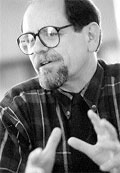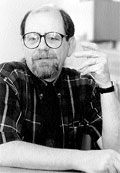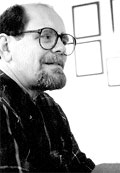 |
 |
|||||
 |
 |
 |
 |
 |
||||||||||||
 |
 |
 |
||||||||||
| Michael Cameron: “If adults don’t know the Bible … we’re not able to do full, adult catechesis. In a sense, it’s like learning the language of the church.” Catholic New World photos/David V. Kamba
The goal: Taking adults back to (Bible) school
Michael Cameron, 50, has served as consultant at the archdiocese’s Office for Catechesis for the last seven years. The Maywood native attended St. Eulalia School and Fenwick High School, but left Catholicism as a young adult and eventually became an ordained Presbyterian minister. He returned to the church and joined the Office for Catechesis while working on a theology doctorate at the University of Chicago Divinity School, thinking he would stay a year or two. During his tenure, he focused on adult catechesis and helped create the Chicago Catholic Scripture School. He left the archdiocese June 30 to take a position on the theology faculty at the University of Portland, a Holy Cross institution. The Catholic New World: I read that you had drifted away from the church and then come back. Why did you drift away? What brought you back? Michael Cameron: I grew up without much conscious interest in religion. I never even dreamed of the possibility of being connected with religion in any way. When I was 20 years old and was on what turned out be my own faith search, I read the “Confessions” of St. Augustine. It’s an entire book written in the form in of a prayer, and he narrates his conversion. He had been raised with Christianity as his religion, but he hadn’t been baptized and he drifted away and found his niche somewhere else. He narrates the way he came back to Christian and actually Catholic faith. That really just overpowered me. Plus, his use of the Bible made me hungry for the Bible. The work is drenched in the Bible. Those two things—despite all the variations in the journey—an interest in the fathers of the church and an interest in Scripture—have been constant. Now, when I read [St. Augustine], even though he was one of the great fathers of the Catholic Church, it was in a Protestant context, and so Protestants started putting to me their questions about Catholicism and the use of the Bible and that sort of thing. They got to me, and I moved in that direction. It took a long time, but eventually I ended up asking myself Catholic questions about the role of the church in interpreting the Bible, the power and the reality of tradition, the authority of the church to give direction in the understanding of Scripture. A lot of people have the idea the church dictates how to understand the Bible, or they close the Bible to Catholics. In fact, the church has defined the ultimate meaning of very few passages. But through the creed and through its magisterium, it gives direction as to how Scripture is to be interpreted. Those are things that I discovered when I started looking at Catholicism again. What I’ve learned since is the depth of Catholicism’s rootage in the Bible. For a lot of people, this is the best kept secret of Catholicism. TCNW: Are you trying to dispel some of that myth with the Chicago Catholic Scripture School? MC: Absolutely. It’s carrying out the vision of Vatican II. The Constitution on Divine Revelation speaks about Scripture being so foundational to Catholic Christian life. Now, it gives us some instruction about a responsible reading of Scripture within the tradition, or with the wonderful phrase that Pope John Paul uses, “reading Scripture within the heart of the church.” If we can get those ideas down and position ourselves within the heart of the church, then Scripture begins to open up in marvelous ways. The practical effect of that opening up is something every Catholic experiences at Mass in the readings. Once upon a time, before Vatican II, there was a single reading from the Gospel, and it was the same reading once every year. Now we’ve completely transformed that, and we have three readings plus the psalm. It brings out what was already inherent in the Mass, which is its Biblical rootage. When we say, “Holy, holy, holy,” we’re invoking Isaiah 6. When we say, “Behold the Lamb of God,” we’re invoking John the Baptist’s words in John Chapter 1, and on and on. If adults don’t know the Bible, at least its broad outlines and its greater texts, we’re not able to do full, adult catechesis. In a sense, it’s like learning the language of the church. TCNW: How do you teach adults about the Bible? MC: We put together a four-year program in which people meet 12 or 13 times a year, all day on Saturday, from 9 to 3:30, between October and May. They get trained and degreed presenters who know the Scriptures and who know how to teach. They have textbooks, we use the Catholic Study Bible, and we also have a workbook. They have lessons that they do and homework that they turn in that gets looked at and commented on. We give feedback so that people are thinking, they’re engaged, they’re returning something of what they’ve learned. Often in adult formation, we don’t ask enough of people. We give them a good experience and then they go away, but the ongoing depth kind of formation that’s required can’t be there. The creativity of the class, the students, has been wonderful. I try to construct it so that it’s not arid recitation and tabulation. We want to get them engaged with the content, but not simply asking personal reflection experiential questions. I think in a sense if you go to that too quickly, it short-circuits the learning process, because you’ve got nothing you’re reflecting on. That requires a way of looking at the text that is skill-based. The first place we want to go is into the text. What were the people who wrote or experienced or read or had proclaimed to them these words, these stories, what were they struggling with? What were the great issues for them? The first thing to do is to project out of yourself and go back and try to reconstruct the original intention. That does not mean all biblical interpretation is exhausted by finding out what the original setting was or finding out what the mind of the author intended. A lot of popular biblical things go that way, too, and don’t move forward to how it can be interpreted religiously. In the Scripture school, we’ll do both. We try to make explicit connections between, say, the texts in their historical setting and what the church teaches today in the Catechism of the Catholic Church. For information on the Chicago Scripture School, contact the Office for Catechesis, (312) 243-3700.
Front Page | Digest | Cardinal | Interview |
||||||||||||